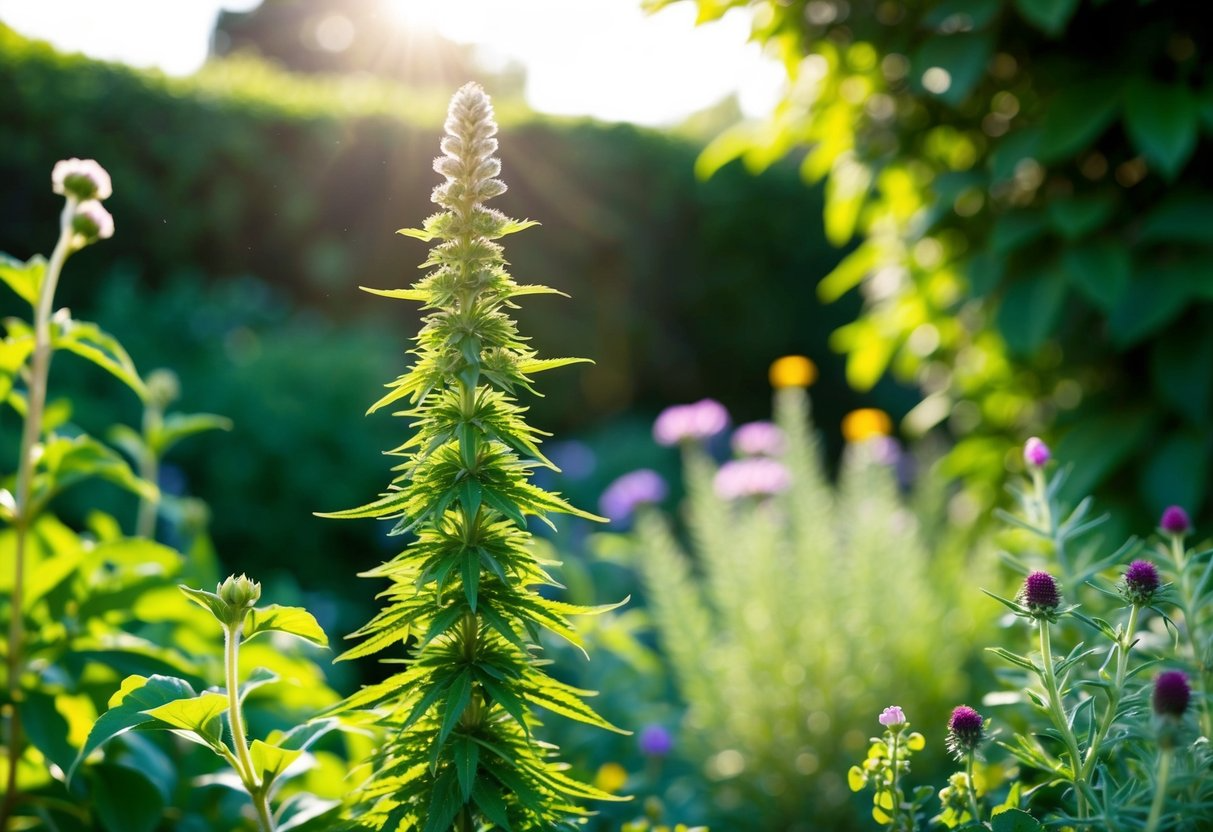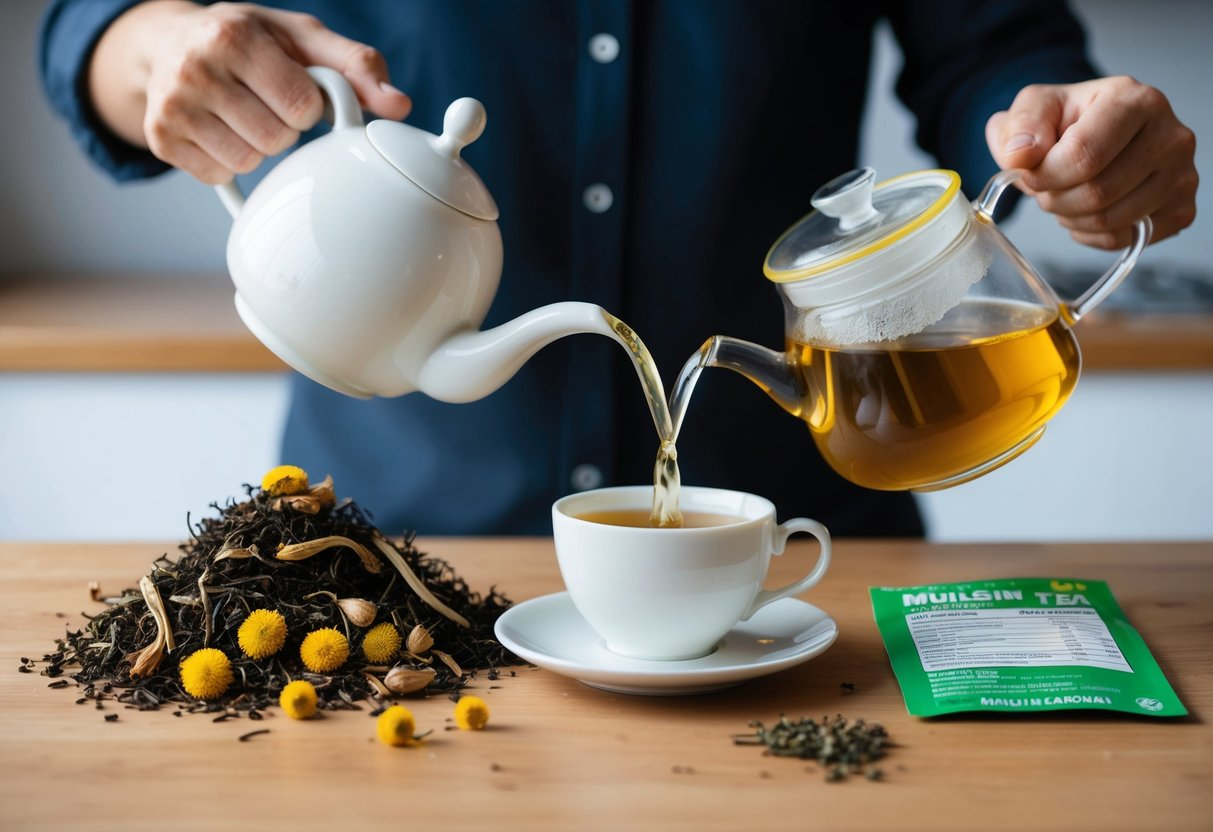Health-conscious folks are turning to mullein tea as a way to overcome various ailments the natural way. Many people wonder about the effects of drinking this herbal tea daily. Drinking mullein tea every day is generally safe for most people and may offer benefits like easing respiratory symptoms and supporting overall lung health.
Mullein tea comes from the leaves and flowers of the mullein plant. Roots digging deep into the past, this botanical belle has seen its fair share of fevers, aches, and sniffles – and has consistently delivered relief. Steeped in tradition, this tea has built a name for itself on consistency and rich flavor. Earthy notes dominate, infusing every bite with a gentle, laid-back charm. Some stand out for their capability to grant an extra layer of wellness or even specific health benefits.
Before making mullein tea a daily habit, it’s important to be aware of possible side effects. Some people may experience skin rashes or allergic reactions . It’s always best to start with small amounts and watch for any negative reactions. If you have any health conditions or take medications, check with a doctor before drinking mullein tea regularly.
Key Takeaways
- Mullein tea is generally safe for daily consumption and may help with respiratory issues.
- With its leaves and flowers expertly blended, mullein tea boasts a gentle, earthy taste that’s easy to love.
- Some people may experience side effects, so it’s wise to start with small amounts and consult a doctor if needed.
Overview of Mullein

Mullein, scientifically known as Verbascum thapsus, is a common plant found in many parts of the world. It’s often called common mullein or great mullein.
Get ready for a towering presence: this plant can grow an impressive six feet tall. Fuzzy leaves as soft as a warm blanket, and vibrant yellow flowers that shine like tiny suns – this plant is a summer sensation.
Mullein has been used for centuries in traditional medicine . Healers and health enthusiasts alike have consistently sought out the plant’s trifecta of goodness – leaves, flowers, and roots – to craft remedies that really work.
Within the plant’s intricate matrix, various compounds boast properties that could. An array of gains comes from regular self-care. These include:
- Flavonoids
- Saponins
- Mucilage
- Tannins
Mullein tea is made from the leaves of the plant. Herbal tea fans habitually incorporate it into their daily routine, relishing the therapeutic benefits and pleasurable taste.
The leaves and flowers of mullein are edible. However, the tiny hairs on the leaves can irritate the throat if not strained properly.
Mullein is known for its potential effects on respiratory health. Some people use it to support lung function.
Despite mullein’s long history of traditional use, researchers have only begun to scratch the surface of its true potential for human health – much remains to be discovered.
Nutritional Profile of Mullein Tea

Mullein tea is made from the leaves and flowers of the mullein plant. In this nutritionally dense food, you’ll discover a complex blend of compounds that work in harmony to provide maximum nourishment.
The flavor profile of this tea is enhanced by its high Harness the power of antioxidants to reboot your system and crank up your defenses against cell damage. Free radicals can’t wreak havoc on your body when these tiny titans are around, neutralizing their harmful energy. Let’s talk about antioxidants – the superheroes of the nutrition world that mop up free radicals and keep your cells humming. Think flavonoids and vitamin C – the potent pair that brings an added layer of health benefits to your plate.
Flavonoids are abundant in mullein tea, with quercetin being the standout star of the show. So, what happens when your body’s built-in warning system – aka inflammation – malfunctions? The inflammation cycle becomes self-sustaining, perpetuating tissue damage and discomfort. Anti-inflammatory agents step in to break this cycle, applying the brakes to the chemical cascade and giving your body a chance to recover. Inflammation is like a constant storm brewing inside your body – but this compound can help calm the waters and restore balance.
Inside every cup of mullein tea, you’ll find saponins hard at work, amplifying the body’s natural defenses against infection and disease. What if you could amplify your body’s natural armor? That’s exactly what these substances can do.
The mucilage in mullein tea gives it a slightly thick texture. Say goodbye to a sore throat and hello to easier breathing with this compound.
While not a significant source of minerals, mullein tea does contain small amounts of zinc and other trace minerals. Steady intake of these contributes to a nutritionally well-rounded lifestyle.
It’s important to note that the exact nutritional content of mullein tea can vary depending on how it’s prepared and the specific part of the plant used.
Sip your way to wellness with the humble mullein tea, packed with benefits for your overall health.

Steep a cup of mullein tea and you might just tap into a wealth of health perks. Breathe easier, ward off infections, and find comfort from belly troubles – this remarkable solution does it all. It’s an incredible ally for anyone fighting respiratory issues or germ-borne illnesses.
Respiratory Health Support
Mullein tea is known for its benefits to the respiratory tract. It’s like a cleaning crew for your airways – this amazing substance helps break down and dislodge mucus, leaving your breathing passages clear. Whether you’re laid up with a nasty cold or a chronic lung condition, this can make all the difference in breathing comfortably again.
The tea may help with conditions like:
- Asthma
- Bronchitis
- Pneumonia
- Tonsillitis
People often drink mullein tea to soothe sore throats and calm coughs. During respiratory infections, this benefit can step in to ease discomfort.
Anti-inflammatory Effects
Mullein has natural anti-inflammatory properties. Swelling decrease is just the beginning – it sets the stage for a dramatic improvement in our physical health.
For the lungs, less inflammation can mean:
- Easier breathing
- Less irritation
- Reduced coughing
These effects might be helpful for people with ongoing lung issues. As you sip on mullein tea, its anti-inflammatory compounds start working to calm irritated airways and soothe discomfort.
Antiviral Properties
Some studies suggest mullein may have antiviral effects. Viruses that cause illness may not stand a chance against this powerful ally.
Drinking mullein tea could potentially:
- Support the immune system
- Help the body resist colds and flu
- Speed up recovery from viral infections
While more research is needed, these antiviral properties might make mullein tea a helpful drink during cold and flu season.
Antibacterial Benefits
Mullein tea has antibacterial qualities. Harmful bacteria don’t stand a chance when this kicks in to fight them off.
Its antibacterial effects could:
- Help prevent infections
- Support overall health
- Aid in healing
These properties might make mullein tea useful for both preventing and recovering from certain types of bacterial infections.
Digestive Aid
Mullein tea may also help with digestive issues. Say goodbye to stomach woes – this wonder supports a happy, healthy gut.
Potential digestive benefits include:
- Reducing stomach cramps
- Easing constipation
- Soothing upset stomachs
Some people drink mullein tea to help with various digestive problems. This natural helpers gentle touch explains why so many people turn to it for a healthy digestive system.
Unlocking the Medicinal Power of Mullein

As we flip through the pages of history, one natural remedy that consistently pops up is mullein – a gentle giant that’s been relied upon for centuries to soothe and cure a multitude of health woes. Ear infections and lingering skin issues cause many a sleepless night. Interestingly, mother nature has a long-known yet underrated solution up her sleeve – or rather, in this plant’s flowers, leaves, and often-overlooked roots.
Ear Infection Treatment
Mullein oil is commonly used for ear infections. Imagine feeling the warm comfort of an ear canal free from pain and inflammation – this might just be the answer. To make mullein oil, people often infuse the flowers in olive oil for several weeks.
The oil is then gently warmed and a few drops are placed in the affected ear. Perhaps the most frightening part of ear infections for kids is the uncertainty – but with this treatment, parents can take a deep breath, knowing their child is on the road to recovery, free from the relentless tug of ear pain.
It’s important to note that mullein oil should not be used if there’s a perforated eardrum. Always consult a doctor before trying any new treatments for ear problems.
Skin Condition Remedies
Mullein has properties that may benefit various skin issues. It can be applied topically to help with:
- Eczema
- Minor burns
- Skin irritation
- Wound healing
Mullein leaf extract might speed up wound healing and reduce inflammation. People often make a poultice by grinding fresh mullein leaves and applying them directly to the skin.
For burns or skin irritation, a cool mullein tea compress may provide relief. Always do a patch test before applying mullein to large areas of skin to check for any adverse reactions.
Additional Herbal Remedies
Mullein offers potential benefits beyond ear and skin treatments. It’s used as an herbal remedy for various conditions:
- Respiratory issues: Mullein tea may help with coughs and congestion.
- Digestive problems: Some people drink mullein tea to ease stomach discomfort.
- Tooth pain: A mullein leaf poultice might temporarily relieve toothaches.
Mullein can be consumed as a tea, tincture, or capsule. Keep your guard up when taking herbal supplements, as their safety can be illusionary. They can interact with medications and may not be suitable for everyone.
Always talk to a healthcare provider before starting any new herbal treatment. Proper usage is especially critical when you’re managing a health condition or multiple medications – that’s why it’s so important to get it right.